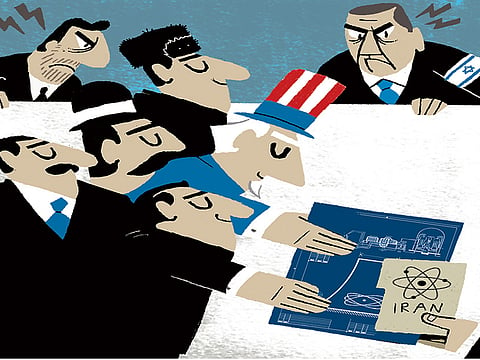Foreign policy isn’t a zero sum game
Washington and its partners may reach a deal with Iran, but it is too simplistic to assume that any such deal will automatically make America and Iran ‘friends’

As the P5+1 (the United States, Britain, France, Russia, China plus Germany) struggle towards a nuclear deal with Iran, it is clear that the prospect of an agreement worries many of America’s allies in the Middle East.
Israel, under Prime Minister Benjamin Netanyahu, appears to be opposed to any deal (or at least any achievable deal) more or less on principle. America’s Arab allies also appear to be less than enthusiastic, albeit for somewhat different reasons.
In the Gulf, this anxiety stems, at least in part, from a fear that the Obama administration’s relentless search for a deal with Tehran means it is also planning to reassess its relationship with the region.
Around the Gulf Cooperation Council (GCC), it is easy to find officials and observers worried that one of Washington’s unspoken goals is to build a strategic partnership with Tehran that would displace the Arab Gulf states as Washington’s main security partner in the region.
Shifting sands
Couple this with the belief among some Americans that the rise of fracking and shale oil will mean complete energy independence for the US and it is easy to see how long-time allies might feel that the sands are shifting beneath them.
Think of this column as a reality check. Or a reassurance. Whichever works best for you.
First, at the most basic level, it is entirely possible (indeed, normal) for the US to be friends with countries that do not, themselves, get along with one another. The most obvious example of this is Israel, which, as everyone reading this column is aware, remains a close ally of the US even at moments like this when the two countries’ leaders are barely on speaking terms.
Second, while the development of new energy resources in the US may change America’s own energy equation, it is not going to alter the basic fact that the industrialised world is dependent on hydrocarbon-based fuels, most of which are priced globally.
This is an issue that is not widely understood in the US itself. Despite the popular belief that America is dependent on oil from the Gulf, America’s main source of imported oil is, and has long been, Canada.
Saudi Arabia is the second-largest US source of imported oil, according to the US Energy Information Administration (USEIA), but its figure is less than one-third of what comes in from Canada and is lower than the combined imports from the number three and four suppliers: Mexico and Venezuela.
The figures from other Gulf states are, considering the size of the US market, nominal (the UAE does not export oil to the US, according to the USEIA).
Put another way: The US is less dependent on Gulf oil than is commonly believed.
This, in turn, means that any reconciliation between the US and Iran is not going to alter America’s energy equation in any significant way no matter how much Iranian oil an easing of sanctions puts into the world market.
Critical region
The bigger point, however, is that even though America is not as beholden to Middle Eastern oil as is popularly supposed that does not really matter. One of the responsibilities that comes with being a superpower is watching the backs of one’s friends and allies.
The US may not import a lot of oil from the Gulf, but countries that matter to America do. That makes the region critical to US strategic calculations not only now but for the foreseeable future, Iran deal or no.
Finally, and most importantly, the idea that a P5+1 deal with Iran will see Washington shift its regional loyalties runs directly up against 35 years of US-Iran enmity.
Washington and Tehran may be talking, US Secretary of State John Kerry and his Iranian counterpart Mohammad Javad Zarif may hold long, seemingly friendly, conversations, outside of the negotiating room, but it is a long way from those human (and fundamentally political) interactions to making the two countries friends, let alone allies. Anyone who doubts this need only look at the rhetoric coming from hardliners on both sides.
All of this is another way of saying that foreign affairs is not necessarily a zero sum game. Washington and its partners may reach a deal with Iran, but it is too simplistic to assume that any such deal will automatically make America and Iran ‘friends’ or that even if it did that would diminish a US-Gulf relationship that both sides have spent decades building.
In any event, there is no Iran nuclear deal. Not yet, at least. Critics on all sides should wait to see what, if anything, emerges from the P5+1 talks. In the meantime, it is worth remembering that while a successful agreement has the potential to change many things in the Middle East, Washington’s relationship with the Arab Gulf states is not likely to be one of them.
Gordon Robison, a longtime Middle East journalist and US political analyst, teaches political science at the University of Vermont.



